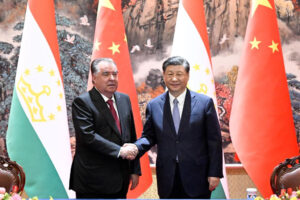Amid record profits, workers want to roll back concessions made to auto industry after the 2008 economic recession. For decades, the head of the powerful United Auto Workers (UAW) union has started negotiations with the CEOs of the US’s top auto executives with a ceremonial handshake. Those days are over.
As UAW members become the latest American workers to consider a massive strike over their union contract, newly elected UAW president Shawn Fain chose to mark the start of the talks by shaking hands with workers instead. “There’s no point in having a big pomp and ceremony where we act like we’re friends, and we’re working together, when we’re not,” said Fain, while meeting with workers at a Ram truck factory in Sterling Heights, Michigan. “The membership comes first. That’s our job.” It was an aggressive move – ending a tradition that goes back to the 1960s – as the UAW’s 150,000 workers at Ford, Stellantis and General Motors push for new union contracts ahead of the expiration of the current contracts on 14 September.
Tough talk has worked recently. The Teamsters threat to call a strike at UPS led to major concessions in their contract negotiation last month. And Fain has taken a combative approach toward the automakers, emphasizing the immense profits of the corporations, multimillion-dollar executive salaries and the concessions workers took due to the 2008 economic recession that have yet to be repaid in subsequent contracts. During a Facebook live stream on 8 August, Fain threw a contract proposal from Stellantis in the trash, accusing the company of seeking concessions from workers. He has expressed the willingness of the union to strike if the automakers don’t offer acceptable proposals to the union, though a strike authorization vote by members has yet to be called.
The UAW has outlined numerous demands ahead of negotiations, including eliminating a two-tiered wage system in which new hires have been paid significantly lower wages for doing the same work, and significant wage increases, with the union citing automaker CEOs who have received on average 40% pay increases over the last four years. Charles Mitchell, a Stellantis worker for 11 years in Detroit, Michigan, said the ongoing contract negotiations reflected worsening wealth inequality between workers and corporate executives and shareholders.
Companies are becoming more profitable and making shareholders richer while forcing mandatory 60- to 70-hour work weeks
Stellantis worker Charles Mitchell
“The ability for an autoworker to provide for a family or even oneself has been more and more difficult. All the while companies are becoming more profitable and making shareholders richer while forcing mandatory 60- to 70-hour work weeks in assembly plants,” said Mitchell. He also criticized the recent rigid attendance policies and mandatory overtime, issues that workers are pushing to address in the contract.
The union has also called for restoring cost-of-living adjustment pay that ties wages to inflation, medical benefits for retirees, a defined pension for all workers rather than 401(k) plans, increases to retiree pay, more paid time off, providing the right to strike to workers over plant closures, enacting a program to protect and support workers who lose their jobs due to plant shutdowns, and strong job security protections amid a transition to electric vehicle production. Recent high-profile new union contract negotiations have successfully eliminated two-tier wage systems at other companies, including a tentative agreement at UPS that members are currently voting on and an agreement at Caterpillar reached earlier this year.
Long hours and broken promises
Since 2006, Dawnya Fernandinsen has worked for General Motors. But because she worked for a parts supplier subsidiary, Delphi, when she rolled over her employment to work directly for General Motors in 2016, she lost 10 years of seniority and her entire pension, an issue facing many Delphi workers that the UAW is seeking to address in bargaining.
“I ended up with no pension, I ended up losing all of my seniority, I ended up with nothing. So I ended up transferring to the General Motors plant that I’m in now in Toledo, Ohio, and had to start all over,” said Fernandinsen. “General Motors has been coming out and saying they don’t want to replace pensions lost or seniority loss, or whatever. But they owe that to us. We were deceived. We were lied to and somebody owes us to return that to us and make us whole again.”
She explained that all workers took concessions after the 2008 economic recession after being assured by General Motors that the takeaways were temporary until the company returned to profitability after bankruptcy, which it did, reaching record profits in 2012. The UAW noted in a video that the big three automakers have reported collective profits of nearly $250bn between 2013 and 2022 and a combined profit of $21bn in the first six months of 2023. The union also cited recent salaries of GM CEO Mary Barra of $29m in 2022, Ford CEO Jim Farley of $21m in 2022 and Stellantis CEO Carlos Tavares of $24m in 2022, contrasting the high executive pay to the lagging wages autoworkers have received since the 2009 concessionary contract. Behind these immense profits, Fernandinsen argued, is a workforce that is being overworked with mandatory forced overtime and divided along different pay tiers and temporary statuses.
“The forced overtime – we are working to death. We are working 12-hour shifts, seven days a week, every day, week after week, month after month, year after year. We are burned out,” added Fernandinsen. “These companies are profiting the way that they are and trying to convince the American people that they’re hurting, but in the same breath coming out and bragging about it, and then telling us they can’t afford everything that we’re putting out there. They’re forcing our hand to strike. It is not going to be on the UAW. What we’re asking for is everything that we lost, everything that they’ve taken from us, everything that they betrayed us with. That’s all we’re asking for and they have the means to give it back.”
Big three retirees are hurting
Autoworker retirees are one group that is pushing hard for a new contract. There are currently more than 300,000 retirees at the big three automakers who rely on retirement benefits. Tony Candela, a retired autoworker since 2011 after working for decades at Chrysler (now Stellantis), served in various roles in union leadership, including as president of UAW Local 136 in Missouri.
In 2009, Candela’s Chrysler plant in Missouri was shut down as part of bankruptcy restructuring during the 2008 economic recession. Amid the recession and in subsequent contracts, the UAW agreed to numerous concessions for retirees including the elimination of inflation protection pay for retirees that provided lump sum payments at the end of the year to workers or widows based on inflation rates, elimination of healthcare for retirees and the takeaway of pensions for many workers, as they were replaced with 401(k)s for autoworkers in agreements in the wake of the 2008 recession.
[Automakers] are making money hand over fist off the backs of the workers and it’s time that workers get their fair share
Retired autoworker Tony Candela
“The word ‘suspended’ does not mean permanent. It’s a temporary situation, but as we speak, it has never been brought back from the big three automakers to membership. They’re still working without a cost-of-living adjustment and retirees still have no protection from inflation,” said Candela. “These people cannot live in this world without any type of protection from inflation. These people can’t survive. They’re living month to month barely on their pension without any protection from inflation and nobody seems to give a damn.” Current employees also made concessions during the 2008 financial crisis that have yet to be reversed, including the elimination of cost-of-living adjustment raises, changes that limited overtime compensation and the enactment of a two-tiered wage system. Candela also criticized the use of bonuses and profit sharing that aren’t negotiated with the union, but often used in lieu of wage increases.
Candela noted that in the 1980s, the UAW granted Chrysler concessions during financial turmoil, but those were returned in later contracts. In the case of the 2008 economic recession, however, those losses to workers have yet to be remedied despite the immense profits US automakers have reported in recent years. “The union has bent over backwards to make these companies successful. They can no longer cry ‘Well, we can’t afford it, we can’t afford this.’ They are making money hand over fist off the backs of the workers and it’s time that workers get their fair share,” added Candela. “It’s time somebody cares. It’s time somebody takes the bull by the horns and starts negotiating a living wage contract for all members, active and retirees.”
In response to the contract demands issued by the UAW, a spokesperson for General Motors said the “breadth and scope” of the UAW’s demands, “at face value, would threaten our ability to do what’s right for the long-term benefit of the team. A fair agreement rewards our employees and also enables GM to maintain our momentum now and into the future.” A spokesperson for Ford added: “We look forward to working with the UAW on creative solutions during this time when our dramatically changing industry needs a skilled and competitive workforce more than ever.”
In a statement, Stellantis criticized Fain and claimed the union’s demands were not feasible: “The theatrics and personal insults will not help us reach an agreement that continues our proud history of providing good wages and benefits to our employees and maintaining Stellantis’ ability to be competitive in the market … We are committed to working with the UAW to reach an agreement based on economic realism, one that supports the long-term health and viability of our operations while responsibly rewarding your contributions.”
Source : The Guardian











